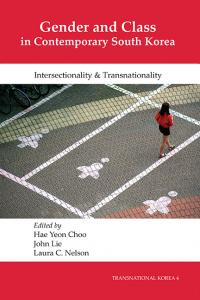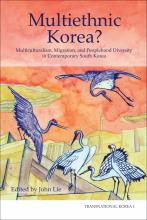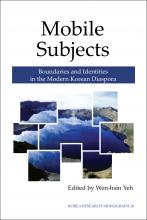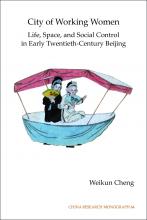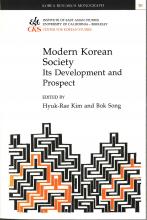Gender and Class in Contemporary South Korea
Gender and Class in Contemporary South Korea
Hae Yeon Choo, ed., John Lie, ed., Laura C. Nelson, ed.
This volume of essays by leading critical scholars examines gender and class in twenty-first-century South Korea from a transnational and intersectional perspective. In addition to framing local phenomena in a global context, the authors also demonstrate how legacies of the past continue into the present.
As a nonprofit academic press, we need your support to publish our books. Your gift can help us make more of our titles available as e-books. DONATE NOW
Title information
This volume of essays by leading critical scholars examines gender and class in twenty-first-century South Korea from a transnational and intersectional perspective. Although gender and class have been central concerns in research on Korea for some time, studies have primarily focused on the role of gender and class in South Korea’s modernization in the latter half of the twentieth century and have overlooked the heterogeneity of Korean identity and the porousness of Korean boundaries. The contributors to this volume frame local phenomena in a global context while maintaining the complexity of simultaneous and dynamic changes in local social relations. By identifying current formulations of gender and class, they also show how legacies of the past continue into the present.
Hae Yeon Choo, ed.
Hae Yeon Choo is an associate professor of sociology at the University of Toronto. Her research centers on gender, migration, and citizenship.
Ph.D. (Sociology, University of Wisconsin-Madison), M.S. (Sociology, University of Wisconsin-Madison), B.A. (Philosophy, Ewha Women’s University, Seoul, Korea)
John Lie, ed.
John Lie (pronounced "Lee") is professor of sociology at the University of California, Berkeley. He studies Korean diasporic trajectories and rethinks the categories of modern peoplehood. His recent works include Zainichi (Koreans in Japan): Diasporic Nationalism and Postcolonial Identity (UC Press, 2008) and an edited volume, Multiethnic Korea? Multiculturalism, Migration, and Peoplehood Diversity in Contemporary South Korea (IEAS, 2015).
A.B. in Social Studies, Harvard University; Ph.D. in Sociology, Harvard University
Laura C. Nelson, ed.
Laura C. Nelson is an anthropologist interested in relationships between distinctions and inequalities. She teaches in the Department of Gender and Women's Studies at the University of California, Berkeley.
Ph.D. (Anthropology, Stanford), Master’s in City and Regional Planning (UC Berkeley)
Gender and Class in Contemporary South Korea (TK 4)
Contributors vii
Acknowledgments ix
1. Introduction: Gender, Class, and Contemporary South Korea 1
Hae Yeon Choo, John Lie, Laura C. Nelson
2. Changelings and Cinderellas: Class In/equality, Gendered Social Im/mobility, and Post-Developmentalism in Contemporary South Korean Television Dramas 16
Jin-kyung Lee
3. Shrewd Entrepreneurs or Immoral Speculators? Desires, Speculation, and Middle-Class Housewives in South Korea, 1978–1996 37
Myungji Yang
4. “My Skill”: Attachments and Narratives of Garment Workers in South Korea 62
Seo Young Park
5. Leave No Birthing Trace: The Politics of Health and Beauty in the South Korean Postpartum Care Market 83
Yoonjung Kang
6. Gendered Narratives of Transition to Adulthood among Korean Work-Bound Youth 106
Hyejeong Jo
7. Diverging Masculinities and the Politics of Aversion toward Ethnically Mixed Men in the Korean Military 130
Hyun Mee Kim
8. Maternal Guardians: Intimate Labor and the Pursuit of Gendered Citizenship among South Korean Volunteers Helping Migrant Women 149
Hae Yeon Choo
|
JOURNAL REVIEWS |
|
“This comprehensive collection...foregrounds intersectionality in a manner that makes it a prerequisite for future studies of social inequality and change. It is recommended both for educators seeking to engage students in critical conversations about contemporary politics in undergraduate classrooms and for scholars in the fields of gender and class studies, (post) developmentalism, globalization, and migration.” ~Jinsook Kim, University of Texas, Austin, in Pacific Affairs, 2019, 93(4): 829-831. (https://pacificaffairs.ubc.ca/issues/current-issue/) |
|
"The main merit of the book is that it offers a feminist analysis of recent socioeconomic and cultural phenomena that have rarely drawn scholarly attention before.... The book makes a great contribution to various fields, especially Korean studies, gender studies, sociology, and anthropology, and will be useful as required or recommended reading in both undergraduate and graduate courses."~Hyaeweol Choi, University of Iowa, in Asian Ethnology, 2020, Vol. 79, No. 1 (2020), pp. 206–208. (https://www.jstor.org/stable/10.2307/26929508) |
|
“The essays as a whole…provide a refreshing new look at some old issues. Many of the contributors to this volume are well-established scholars whose names will be familiar to students of Korea, but there are a few newcomers as well. The quality of the essays is uniformly high, making it impossible to select highlights.” ~ Clark W. Sorensen, University of Washington, in Journal of Asian and African Studies 55.4 (2020): 617–618. (https://journals.sagepub.com/doi/full/10.1177/0021909619887544) |

